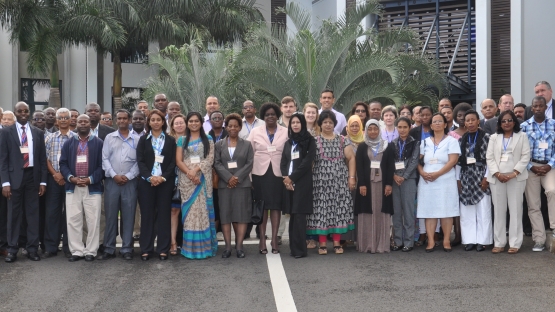Tephritid fruit flies pose a serious threat to farming activities and require an integrated approach in order to reduce damage to local fruits. As part of an initiative to address this problem, the IAEA, in collaboration with the Ministry of Agro Industry and Food Security of Mauritius, held a combined regional training course (29 June to 3 July 2015) and regional coordination meeting (1 - 3 July 2015) in Bagatelle, Mauritius. The two events were organized within the framework of the IAEA regional technical cooperation project 'Preventing the Introduction of Exotic Fruit Fly Species and Implementing the Control of Existing Species with the Sterile Insect Technique and Other Suppression Methods' (RAF5062), which is supported by the Joint FAO/IAEA Division.
The training course, which was facilitated by Mr Eric Jang (USDA), Mr. Preeaduth Sookar (Ministry of Agro-Industry and Food Security, Mauritius) and Mr Rui Cardoso Pereira (FAO/IAEA) enhanced the participants' knowledge and practical skills on technical aspects like fruit fly life cycle ecology and population dynamics, surveillance, detection, monitoring, Male Annihilation Technique (MAT), biological control methods, Sterile Insect Techniques (SIT) and selection and integration for Area Wide programmes. The highlight of the training course was a 2-days field work involving, sanitation including the use of the augmentorium, traps and MAT blocks installation, bait sprayapplication and release of sterile male insects as well as observation of the mass-rearing and irradiation facilities.
On the other hand, the purpose of the meeting was to assess the project progress and to review and evaluate the implementation of the Memorandum of Understanding (MoU) on Strengthening Sub-regional Cooperation for Preventing the Invasion of Exotic Fruit Fly Species and Improving Control of the Existing Species as well as discussing further mechanism for exchange of information and sharing of resources among the parties. This MoU was signed in Mauritius on June 14, 2013 by 6 countries, namely France (La Reunion), Madagascar, Mauritius, Mozambique, Seychelles and the United Republic of Tanzania. All the five African countries were represented at the meeting by their respective ministries responsible for agriculture, while France (Reunion) was represented by French Agricultural Research Centre for International Development (CIRAD). The meeting was also attended by representative from the International Centre of Insect Physiology and Ecology (ICIPE).
The meeting was officially opened by Mr V Punchoo, Chief Agricultural Officer, on behalf of the Minister of Agro Industry and Food Security. Mr Punchoo highlighted the fruit fly control activities in Mauritius and thanked the IAEA for continuous support, spanning almost four decades.
Speaking at the official opening of the meeting on behalf of Mr Mulugeta Amha, Acting Director of the Department of Technical Cooperation's Africa Division, Mr Michael Kiza described the scope of the challenge: "Fruit flies require no visas to cross from one country to another - sometimes through passengers' luggage. Hence, their prevention, early detection and control calls for international collective action with all countries and relevant international organizations taking their parts in capacity building as well as applying the available quarantine, detection, suppression and control methods, and sharing valuable information with neighbours." Mauritius was appreciated for the leading role and great contribution in the utilization of the environmentally friendly SIT for control of fruit fly in this sub region, which is demonstrated by ownership and strong commitment - including direct financial contribution toward the acquisition of the irradiator to sterilize the insects, which will benefit the whole sub-region.
Also speaking at the opening ceremony, the United Nations Resident Coordinator for Mauritius, Mr Simon Springett, underscored the importance of inter-agencies partnership in addressing development challenges in the member states. He mentioned that the Joint FAO/IAEA Division "is a perfect example of two UN agencies forming part of the United Nations Country Team working together efficiently and 'Deliver as One' the best results to a host country". Mr Springett further noted that this initiative fits into the drive for a green economy transition for Mauritius as well as other countries by helping improve farmers' livelihoods by improving their yield through use of environment friendly methods, protect the environment from harmful effects of insecticides, as well as protect the health of consumers.
During the meeting, Dr Sunday Ekesi (ICIPE) presented the fruit fly research programme at his institution as well as the African Fruit Fly Project for Southern Africa being implemented by FAO in collaboration with Southern Africa Development Cooperation (SADC) and ICIPE in Botswana, Namibia, Zambia and Zimbabwe (the BONAZAZI project). Dr Helene Delatte (CIRAD) presented the fruit fly research and management programme being implemented by CIRAD in African countries. The participants explored the mechanism for coordinating all these efforts.
The major outcome of the meeting is that the participants agreed that there is a need to coordinate all these efforts to create more impacts. Opportunities for implementing joint activities were explored. The project work plan for the proposed IAEA regional technical cooperation project for the 2016/17 cycle was accordingly reviewed to reflect some joint activities. The meeting participants agree that such collaboration would be more effective on the management of fruit fly in Africa.


